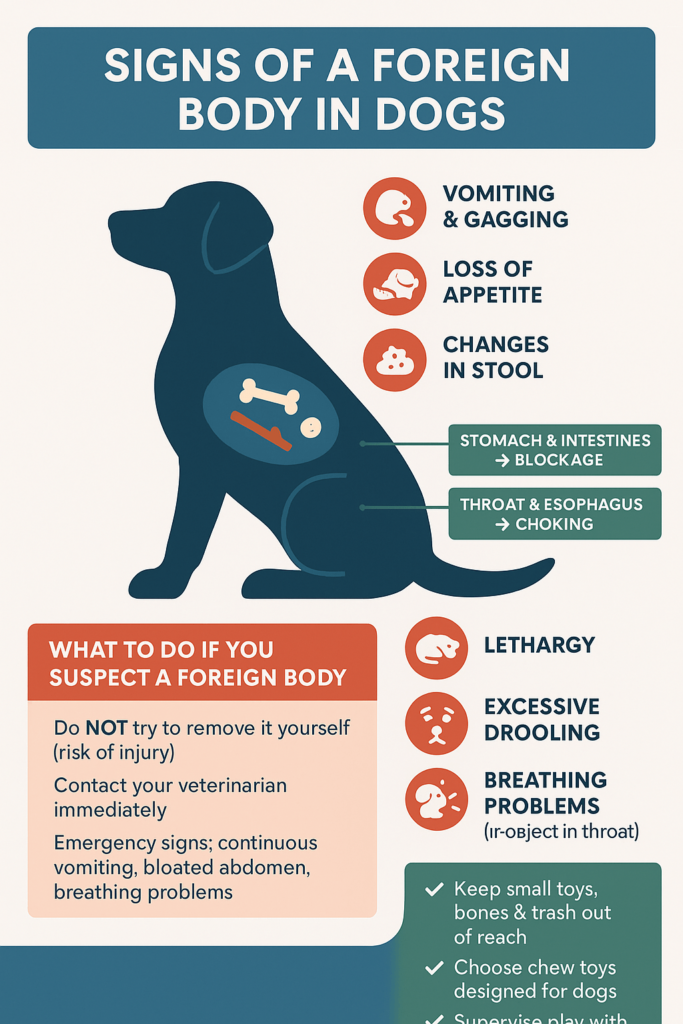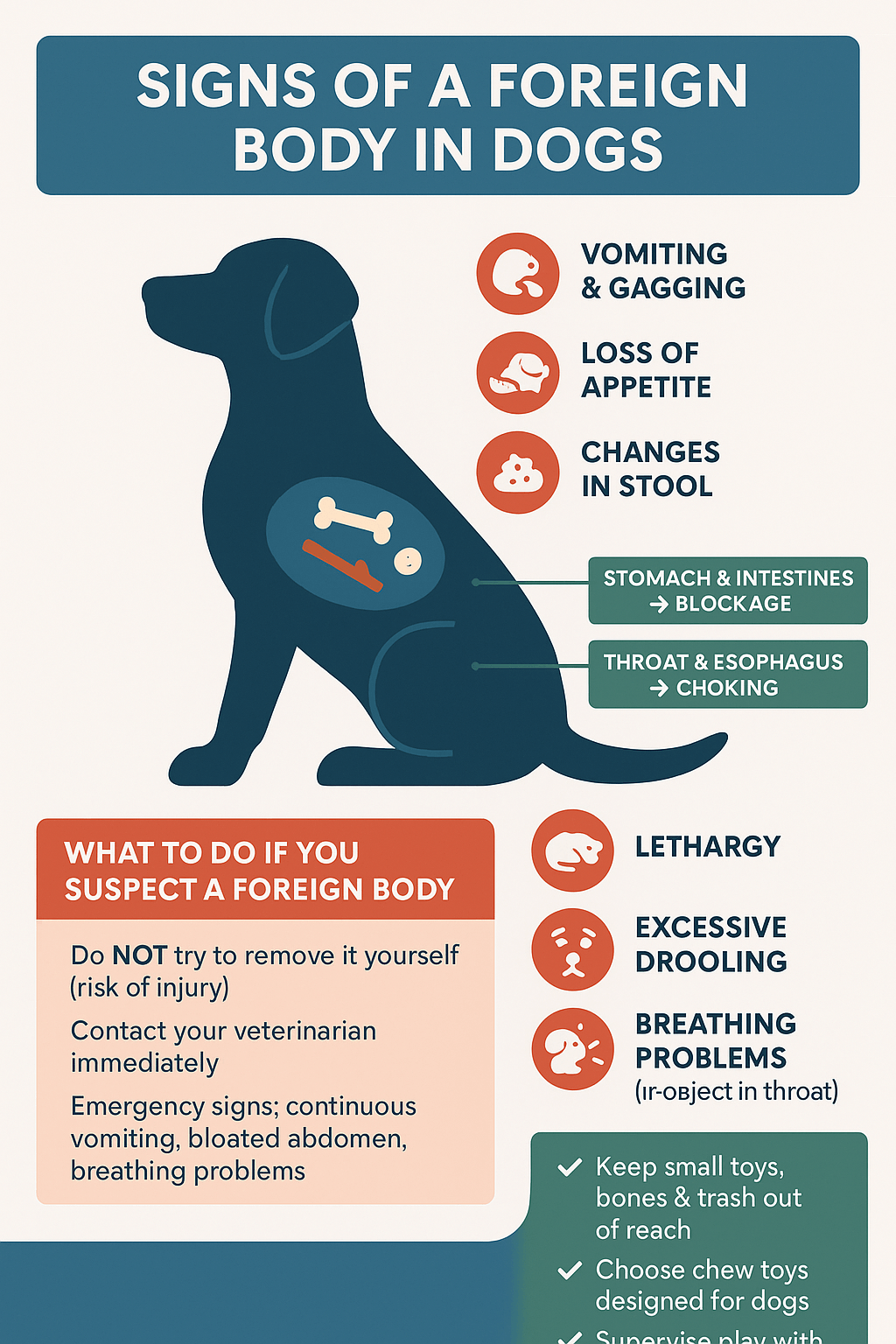Signs of a Foreign Body in Dogs
Dogs are naturally curious creatures, often exploring the world with their noses and mouths. While this curiosity is endearing, it can sometimes lead to trouble—like swallowing or getting foreign objects stuck in their bodies. A foreign body in dogs refers to any object that becomes lodged in their throat, stomach, intestines, or other areas, causing discomfort or serious health issues. Recognizing the signs early can make all the difference in ensuring your furry friend receives prompt treatment. In this blog post, we’ll explore the common symptoms, risks, and steps you can take if you suspect your dog has ingested or encountered a foreign body.
Expert Insight on Foreign Bodies in Dogs
“Most owners have experienced the scare of their dogs ingesting something that can cause harm. Canines are curious creatures and will investigate anything that strikes their fancy. When such an investigation leads to a dog eating something that is not digestible, it’s called a foreign body.”
Common Signs of a Foreign Body in Dogs
Detecting a foreign body in your dog early is crucial for preventing complications. Here are some telltale signs that your dog may have ingested or become affected by a foreign object.
Excessive Drooling:
If your dog is drooling more than usual, it could indicate irritation or blockage in their throat or digestive tract.Vomiting or Retching:
Persistent vomiting, especially without producing anything, may suggest an obstruction caused by a foreign body.Loss of Appetite:
A sudden refusal to eat or lack of interest in food can be a red flag for gastrointestinal distress.Lethargy or Weakness:
Dogs with foreign bodies often appear unusually tired or unwilling to engage in physical activity.Abdominal Pain or Swelling:
If your dog shows signs of discomfort when touched around the abdomen, it could indicate an internal blockage.
These symptoms should not be ignored, as they can escalate quickly. Early intervention is key to avoiding severe complications.

Types of Foreign Bodies and Where They Get Stuck
Foreign bodies can vary widely in type and location, depending on what your dog has ingested or encountered. Understanding these variations helps identify potential risks and act accordingly.
Small Objects in the Throat:
Items like bones, toys, or sticks can lodge in the throat, causing choking or difficulty breathing.Indigestible Items in the Stomach:
Non-food items such as socks, rubber balls, or rocks may sit in the stomach, leading to nausea or vomiting.Sharp Objects in the Intestines:
Sharp objects like needles, toothpicks, or splintered bones can pierce the intestinal walls, causing infection or perforation.String or Fabric in the Digestive Tract:
Linear foreign bodies like string, yarn, or fabric can bunch up the intestines, creating a life-threatening condition.Outdoor Hazards Like Grass Seeds:
Grass awns or seeds can embed in paws, ears, or nasal passages, causing localized irritation or infection.
Knowing where and how foreign bodies affect dogs highlights the importance of monitoring their environment and behavior closely.
Check this guide 👉Cost of Dog Surgery to Remove Foreign Object: Best 7 Tips!
Check this guide 👉Understanding Foreign Body Surgery in Dogs: Best 7 Tips!
Symptoms to Watch For | Possible Causes of Foreign Bodies |
|---|---|
Excessive drooling | Bones, toys, or sticks in the throat |
Persistent vomiting | Indigestible items in the stomach |
Loss of appetite | Blockages in the digestive tract |
Lethargy or weakness | Internal injuries or infections |
Abdominal pain or swelling | Sharp objects piercing the intestines |
Steps to Take If You Suspect a Foreign Body
If you notice signs of a foreign body in your dog, acting swiftly is essential. Follow these steps to ensure your pet receives the care they need.
Stay Calm and Assess the Situation:
Observe your dog’s behavior and note any specific symptoms to share with your veterinarian.Do Not Attempt to Remove the Object Yourself:
Trying to pull out a foreign body, especially from the throat or nose, can cause further injury.Prevent Further Ingestion:
Remove access to potentially harmful objects or areas to avoid worsening the situation.Contact Your Veterinarian Immediately:
Call your vet to describe the symptoms and seek advice on whether emergency care is needed.Transport Your Dog Safely:
Keep your dog calm and secure during transport to the clinic, using a carrier or leash as necessary.
Quick action and professional guidance are vital to resolving foreign body issues effectively.
Preventing Foreign Body Incidents in Dogs
Prevention is always better than cure when it comes to protecting your dog from foreign body hazards. These tips can help minimize risks in your home and outdoor environments.
Supervise Playtime:
Keep an eye on your dog during play to ensure they don’t swallow small toys or parts.Dog-Proof Your Home:
Store hazardous items like strings, rubber bands, and small objects out of reach.Provide Safe Chew Toys:
Offer durable, size-appropriate chew toys to satisfy your dog’s chewing instincts safely.Avoid Feeding Dangerous Foods:
Prevent access to bones, rawhide, or other items that could splinter or cause blockages.Inspect Outdoor Areas:
Check your yard for grass seeds, sharp debris, or other potential hazards before letting your dog roam.
By taking proactive measures, you can significantly reduce the risk of foreign body incidents.
Common Household Items That Pose Risks
Many everyday household items can become dangerous foreign bodies for dogs. Being aware of these hazards allows you to create a safer environment for your pet.
Rubber Bands and Hair Ties:
Small elastic items can easily be swallowed and cause intestinal blockages.Coins and Batteries:
Ingesting coins or batteries can lead to poisoning or internal burns due to chemical reactions.Socks and Underwear:
Dogs often mistake clothing items for toys, which can get stuck in their digestive tract.Plastic Bags and Wrappers:
These can cause choking or suffocation if ingested or inhaled.Houseplants:
Certain plants, like lilies or philodendrons, can be toxic if chewed or swallowed.
Removing these items from your dog’s reach minimizes the risk of accidental ingestion.
Outdoor Dangers for Active Dogs
Active dogs who spend time outdoors face unique risks when it comes to foreign bodies. Understanding these dangers helps you safeguard your pet during walks or playtime.
Grass Awns or Foxtails:
These sharp seeds can burrow into skin, ears, or paws, causing pain and infection.Fishhooks or Fishing Line:
Dogs near fishing areas may step on hooks or ingest line, leading to injuries.Broken Glass or Metal:
Discarded trash or debris can cut paws or lodge in soft tissues.Animal Bones or Carrion:
Scavenging dogs may ingest bones or rotting meat, risking blockages or illness.Mulch or Decorative Stones:
Curious dogs might swallow decorative garden materials, causing obstructions.
Being mindful of these outdoor hazards ensures safer adventures for your dog.
Signs of Chronic Foreign Body Issues
Some dogs may develop recurring foreign body problems due to behavioral tendencies or environmental factors. Recognizing chronic patterns can help address underlying causes.
Repeated Vomiting Episodes:
Frequent vomiting over weeks or months may signal ongoing digestive issues related to foreign bodies.Chronic Paw Licking or Chewing:
Persistent licking of paws could indicate embedded objects like grass seeds or thorns.Unexplained Weight Loss:
Difficulty eating or digesting food due to blockages can lead to gradual weight loss.Recurrent Ear Infections:
Foreign bodies trapped in the ear canal can cause repeated infections if not removed.Behavioral Changes:
Anxiety, aggression, or withdrawal may stem from discomfort caused by undetected foreign bodies.
Identifying these patterns allows for targeted interventions and long-term solutions.
Frequently Asked Questions About Foreign Bodies in Dogs
What should I do if my dog swallows a foreign object?
Contact your veterinarian immediately and avoid attempting to remove the object yourself.
How will the vet diagnose a foreign body?
Vets use physical exams, X-rays, or ultrasounds to locate and assess the foreign object.
Can a foreign body pass naturally?
Some small objects may pass through the digestive system, but larger or sharp items often require intervention.
Are certain breeds more prone to foreign body issues?
Breeds with strong chewing habits or those prone to scavenging are at higher risk.
How much does treatment for a foreign body cost?
Costs vary depending on the severity, ranging from minor procedures to complex surgeries.
Staying Vigilant for Your Dog’s Health
Foreign bodies pose a significant risk to dogs, but awareness and quick action can prevent serious complications. By understanding the signs, knowing how to respond, and taking preventive measures, you can protect your furry companion from harm. Remember, your dog relies on you to keep them safe, so staying vigilant about their environment and behavior is crucial. With love, care, and attention, you can ensure your dog leads a happy, healthy life free from the dangers of foreign bodies.
Dog Tapeworm Life Cycle: Best 7 Expert Tips! – Learn how tapeworms infect dogs, spot symptoms, and break the cycle with expert prevention strategies.
Anxious Cat Body Language: Best 7 Expert Tips! – Learn to spot signs of stress, understand triggers, and help your cat feel safe and relaxed.
Anxious Dog Body Language: Best 7 Expert Tips! – Learn to spot signs of anxiety, respond effectively, and help your dog feel safe and secure.
Is Breeding Dogs Bad? Best 7 Expert Tips! – Explore the ethics, benefits, and risks of dog breeding to make informed decisions for a better future.





